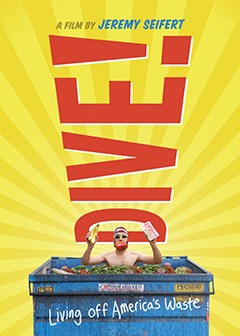
In the 2010 documentary Dive!, filmmaker Jeremy Seifert introduced viewers to the subculture of dumpster diving — consuming food that has been thrown away by grocery stores — and investigated how this food waste could be used to help feed America’s millions of hungry and food-insecure communities. Food & Nutrition spoke with Seifert about the movie and his experiences dumpster diving.
F&N: You talk in the movie about the food safety aspects of dumpster diving. Has anyone — friends, family or audiences — ever expressed concerns about feeding your young children food from the garbage?
Yeah, definitely. Maybe in every Q-and-A, there was one person who was really, really concerned from that perspective of food safety. But, you know, like [anthropology professor and expert in food waste] Timothy Jones says, we’ve grown so apart from food in this culture, and where food comes from, that a lot of people are literally afraid of food. People are afraid of it in the sense that we don’t understand it, we don’t know where it comes from.
No one in my family and none of my friends have ever gotten sick from food out of the dumpster. And I think the main reason — not that dumpsters are so clean — the main reason is that we learned a lot about food. I remember my parents-in-law at first were like, “What? Jeremy, what the hell are you doing?”
And then they had a really amazing meal with nice organic, free-range chicken on the grill and some asparagus and some yummy rosemary sourdough bread, it changed their minds. I think that’s one of the values of dumpster diving, or of eating trash; you don’t have to make a lifestyle out of it, but even doing it once, the moment you do eat trash — but it’s a nice meal with friends — it really changes your perspective as you look out at the world.

F&N: Was it difficult to be sure you were getting a good balanced diet from food from the garbage?
The thing about Dive!, and one of the reasons I think it did so well at festivals, is that it’s very sincere and real. There was no gimmick like, “We’re going to try to eat only dumpster food for 30 days and see what happens!” or “Live off it for a year!” This was just what we did. I wasn’t ever trying to exclusively feed my family from dumpster food. At first, dumpster food was supplemental to regular groceries. And then groceries became supplemental to dumpster diving, because we were getting such large amounts of food.
F&N: In the film, you spent a lot of time trying to get Trader Joe’s to change its policy regarding food waste and donations. Have you have communicated since the film was released?
Oh yeah, quite a bit.
F&N: Has it been productive?
Yeah, I mean it’s more friendly communication, but it’s very much like talking to a politician. “Thank you so much.” And, “We’re going to keep doing what we’re doing but we’re going to do it better.” Because what we were asking them was to adopt a corporate-wide policy to end food waste in all of their stores. And they would not do that, and they will not do that still.
But we got this really cool email from a food bank in Boulder, Colo. The guy was like, “Thank you guys so much! What you’re doing is making a huge difference.” And what it was, was a pep rally letter to remind all the [Trader Joe’s] store managers that they do, as a company, stand for our communities, and let nothing be wasted, and make sure that seven days a week you are connecting with local organizations, charities, to give all your food away.
But I think the biggest difference has just been at the grassroots level. You know, people seeing the film, awakening to food waste, hopefully working toward eliminating it in their homes, learning how to compost again. I get emails all the time from schools, universities, people setting up screenings, little organizations starting because of the film. So that’s great. And that’s kind of how I ended the film with that quote from Noam Chomsky: “Change doesn’t trickle down from above, it grows from below.” So to expect it to come from these bigger powers or from the government or from some big corporations, no I don’t think that’s really how it happens. It’s amazing how fragile [corporations] are, and how responsive they are to consumers, their customers. And that’s where we’ve failed to exercise that power as citizens, the power of our voice.
F&N: Say in five years, stores eliminate food waste — or it all goes to those who need it — is that a good thing? Will dumpster divers be mad at you?
Yes, that’s a good thing! The goal is empty dumpsters and full bellies and for there to not be any food in dumpsters. Because no matter how much I think it is an act of justice and dignified to jump into a dumpster and save food from being destroyed and wasted, no one should be getting their food out of the dumpster. It is sort of indecent to ask someone to do that. To choose to do it is a different story, but to ask to do it is something else.
My goal was never to make dumpster diving better for dumpster divers. The goal was to expose something that’s broken in our society. Food waste is just one aspect of that, but one that we can eliminate, and we can deal with. That’s maybe why it’s a pretty hopeful film — because it’s not so big and so immense we really are paralyzed by it. It’s something we can change.
Learn more about Dive! and how to view the documentary at DivetheFilm.com.
